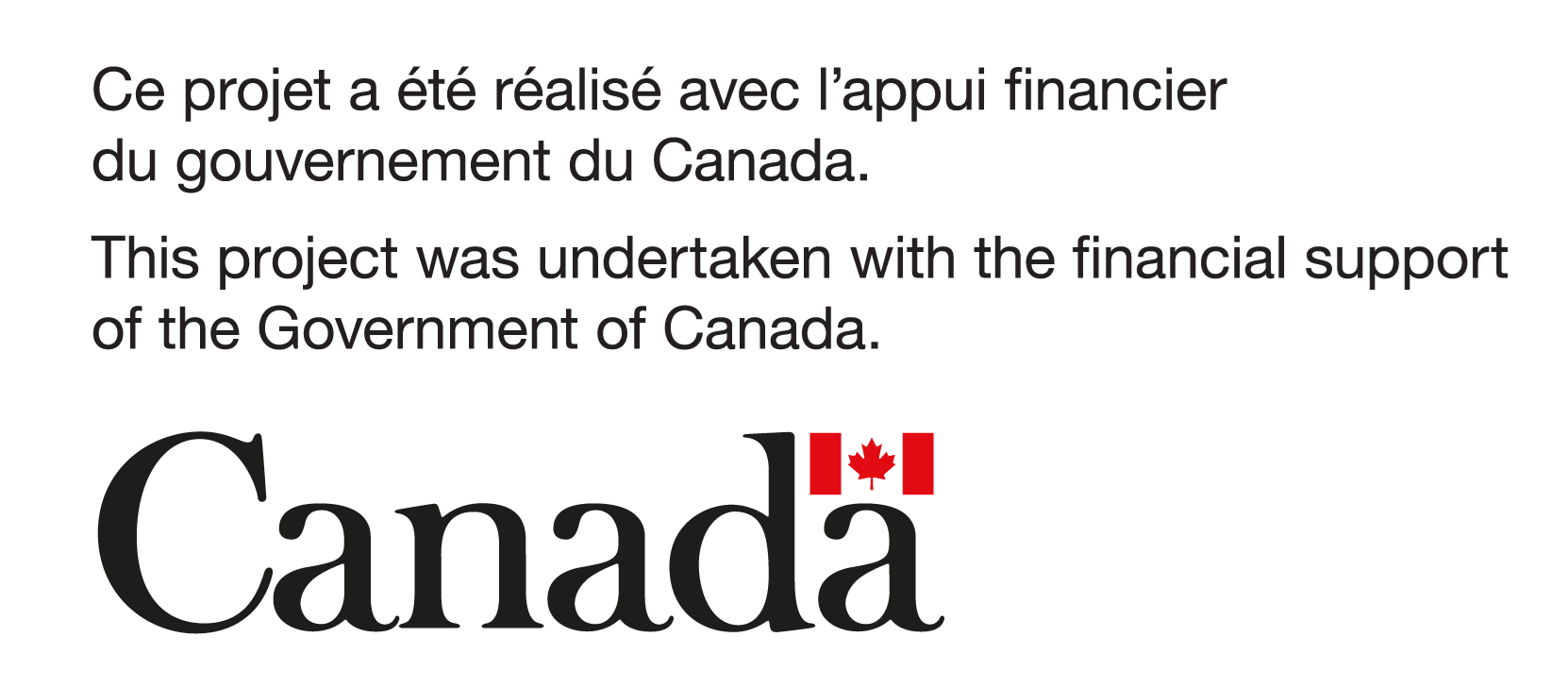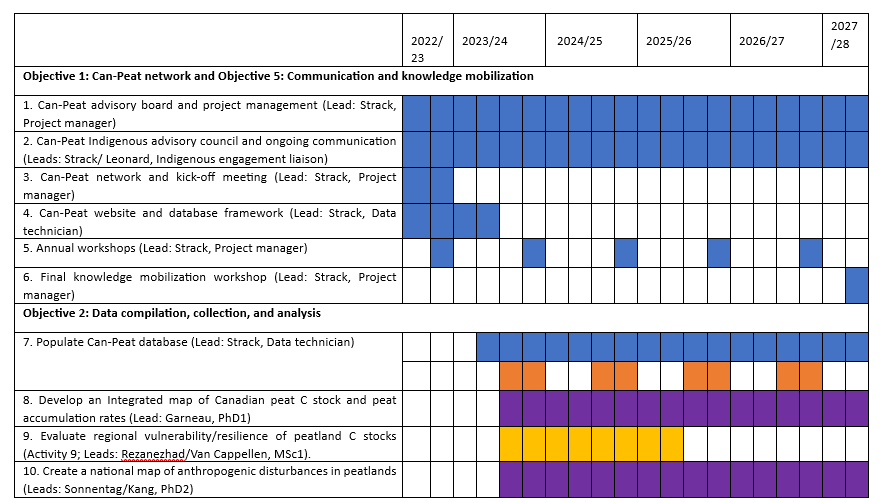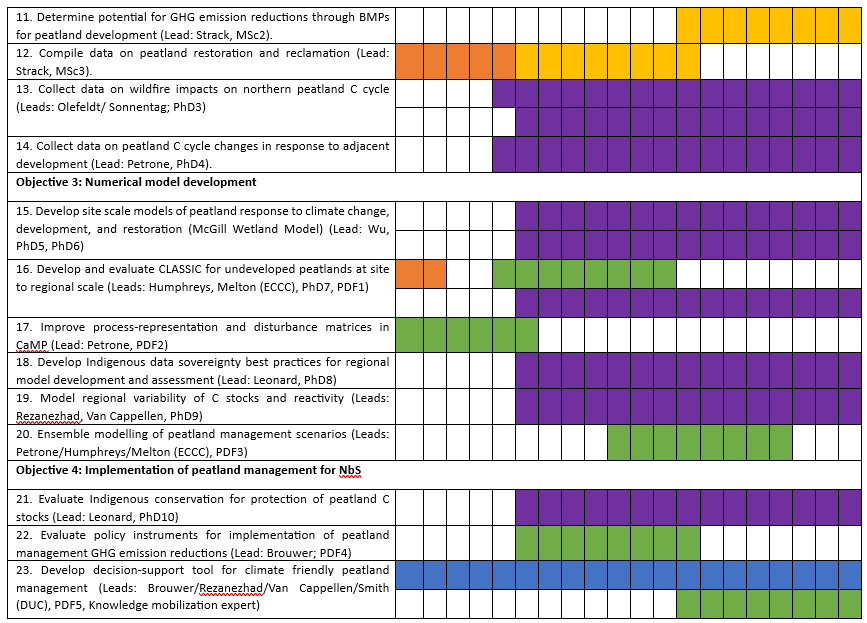
Updated August 21, 2024
Can-Peat Handbook
Preface
This document serves as a general introduction for new Can-Peat HQP (highly qualified personnel) to the project workings. Please refer to your research group or/and institution’s guidelines and policies for more detailed information.
As a member of the Can-Peat team, you are expected to positively contribute and adhere to the guidelines outlined in this handbook. This includes contributing to the project objectives and goals, following the code of conduct, attending the in-person annual workshops, contributing to the newsletter and LinkedIn, and providing quarterly updates of your research progress on request.
Project Overview
Can-Peat: Canada’s peatlands as nature-based solutions to climate change (hereinafter referred to as Can-Peat) is a 5-year research initiative funded through the Climate Action and Awareness Fund (September 2022 – August 2027) by Environment and Climate Change Canada (ECCC). The objective of the project is to quantify the potential of peatland management in Canada to contribute to climate change mitigation. The research supports Canada's commitment to reach net-zero emissions economy by 2050. Specific objectives are to:
- Create a Canada-wide peatland research network.
- Compile a database on peatland carbon stocks, greenhouse gas exchange, and supporting data across Canada.
- Advance models of peatland carbon cycling from site to national scale and use these models to evaluate future peatland greenhouse gas uptake or emission under changing climate and disturbance regimes.
- Investigate mechanisms to implement peatland nature-based solutions in Canada and develop a decision-support framework for peatland management.
- Communicate findings to partners and provide the tools needed for climate-friendly peatland management and greenhouse gas emission reporting related to these activities.
Communication and professional development
Throughout the Can-Peat project, there will be opportunities for research communication and professional development at the annual workshops, all-hands meetings, online workshops, and webinars. HQP are expected to present their research at conferences where appropriate and at the annual workshops on request. HQP will also be expected to provide research updates for the quarterly newsletter, reports to the Indigenous Advisory Committee (IAC) and Science and Policy Advisory Board (SPAB), and the annual reports to ECCC.
Quarterly Reports
Can-Peat provides quarterly reports (January, April, July, and October) to the IAC and SPAB on the overall Can-Peat project and individual HQP projects. HQP are required to fill out the report template provided in the Appendix and submit to canpeat@uwaterloo.ca at least two weeks prior to the end of the reporting month.
Can-Peat LinkedIn Page
Every other week, Can-Peat runs an HQP takeover of the project LinkedIn page where HQP are given the opportunity to showcase their research to the Can-Peat team and wider peatland network. Each HQP is expected to take over for a week and post on topics such as an introduction or update to your Can-Peat project or other peatland work, field or lab photo, poster/presentation, or event highlight, etc.
Expenses
Travel expenses related to attending our workshops and outside conferences may be covered by your supervisor. Please ensure you speak with your supervisor about valid expenses as home institutions may have additional requirements for travel expenses. Note that food expenses can be submitted via receipts or by per diem as under the University of Waterloo rates of $80 a day. Alcohol expenses may not be claimed.
Collaboration
One of the objectives of Can-Peat is to bring together peatland researchers across Canada (and internationally) to harness the collective power of the knowledge and data we have. Therefore, we value collaboration and encourage collaboration among Can-Peat researchers and with the broader peatland community.
In Can-Peat we aim to support Indigenous-led peatland conservation and management. For help in identifying, reaching out, building or maintaining relationships with Indigenous communities and/or People, please reach out to your supervisor or the Can-Peat project manager to consult Johnston or the IAC.
As a member of the Can-Peat team, we want to hear your ideas. Feel free to reach out to anyone on the Can-Peat member list about potential collaborations or research project ideas. The Can-Peat Project Manager can also help make connections if needed. Once you have a proposed collaborative project, we recommend that you create a project outline with clear objectives, collaborator roles, and timelines. Reach out to your supervisor, the Can-Peat Director, or Can-Peat project manager if you need help getting a project outline started.
You can submit your research project for inclusion on the Can-Peat website (see Canadian Peatlands Project List). Anyone may submit a project if it is focused on Canadian peatlands. This is also a great place to learn about other projects related to Canadian peatlands.
Data Management
Along with general good practices in data management, Can-Peat is dedicated to empowering Indigenous data sovereignty and providing open-access data.
Indigenous Data Sovereignty
Indigenous data sovereignty is the right of a nation to govern the collection, ownership, and application of its own data. It derives from Indigenous Peoples’ inherent right to govern their peoples, lands, and resources. This principle is inclusive of peatland research and regions within the proposed study.
HQP are expected to generate and share data consistent with FAIR principles (Findable, Accessible, Interoperable, and Reusable) as supported by the TriCouncil (i.e., NSERC, CIHR, SSHRC), while implementing CARE principles for Indigenous data governance.
Local Contexts
Local Contexts is a global initiative that supports Indigenous communities with tools that can reassert cultural authority in heritage collections and data. Supervisors are responsible for adding their projects to Local Contexts. HQP need to make an account in Local Contexts to be added to their projects.
Open access
In alignment with our goal of improving existing data accessibility through the development of the Can-Peat metadata repository, all data produced during the project is expected to be published in an open-access database. HQP will work with their supervisors to submit their data to the most appropriate database. Fees and costs associated with publishing are to be covered by your supervisor.
Research Outputs
Along with preserving data, Can-Peat members are encouraged to preserve theses, posters, and presentations. See the below resources to consider when preserving research outputs, including peer-reviewed articles:
- Consider inclusivity in communications.
- Use DOIs to share research outputs in locations such as websites or social media. Hyperlinks are not as easily tracked or comprehensively tracked.
- Copyright all research products, not just peer-reviewed articles, and apply licenses that allow maximum accessibility.
See below Acknowledgements section for information on properly acknowledge Can-Peat and the project funder.
Please inform canpeat@uwaterloo.ca about your research outputs such as publications, presentations, posters, theses, datasets etc.
Acknowledgements
Can-Peat and Funder
Funder acknowledgements must be accurate and consistent across all outputs.
All project outputs are required to acknowledge the Can-Peat project and ECCC’s financial contribution to the research, including publications, public information releases, advertisements, promotional announcements, activities, speeches, lectures, interviews, ceremonies, and its digital channels.
Any material that includes the Government of Canada logo and/or acknowledgement statements must be sent to the Can-Peat project manager (canpeat@uwaterloo.ca) prior to printing and/or distribution for ECCC approval.
All project outputs are also required to acknowledge the Can-Peat project.
- For presentations, please include the Can-Peat logo and the Government of Canada logo on your title or acknowledgements slide. Please use your institutional branding guidelines (UWaterloo guidelines).
- In publications, please use the following statement: “This research was part of Can-Peat: Canadian peatlands as nature-based climate solutions. This project was undertaken with the financial support of the Government of Canada. Ce projt a été réalisé avec l’appui financier du gouvernemnet du Canada.”
Logos


The Government of Canada logo cannot be used without the statement, which must include both official languages. If space does not permit, the following statement can be used: “This project was undertaken with the financial support of the Government of Canada. Ce projt a été réalisé avec l’appui financier du gouvernemnet du Canada.”
The land on which we work and live is the traditional territory of different Indigenous Peoples/communities. It is important for settlers to give territorial acknowledgments during presentations and in publications to acknowledge Indigenous rights. If you are unsure on which traditional territory you work, refer to Native Land Digital.
In both written works and presentations, a territorial acknowledgement should include which territories and Treaty the study area is in and the area in which you work. The University of Waterloo has an official acknowledgement available.
Territorial acknowledgements are only one small step on a path towards reconciliation between settlers and Indigenous peoples. You are encouraged to personalize your territorial acknowledgement and consider additional actions you can take on the path towards reconciliation. For more information on territorial acknowledgements and why they are important, this Native Land article by Allison Jones is a good starting point.
Code of Conduct
Overview
We value the participation of every member of our community and want to ensure everyone has an enjoyable and fulfilling experience, both professionally and personally. Accordingly, all members of the Can-Peat team are expected to show respect and courtesy to others at all times. We create our culture, and our culture is inclusive.
Please note that this code of conduct is not a legal document, supplementing, but not trumping, Department and/or University level policies for your level of employment or study at your institution.
Inclusivity and diversity
Enjoyable, high-quality research can only be conducted when you feel safe, secure, and supported. Maria Strack, as lead of Can-Peat, and all team members are thus dedicated to a harassment and discrimination-free experience for everyone. Harassment includes offensive verbal comments related to gender, sexual orientation, disability, physical appearance, body size, race, religion, sexual images in public spaces, deliberate intimidation, stalking, following, harassing photography, or recording, sustained disruption of discussions, inappropriate physical contact, and unwelcome sexual attention.
We are here to lift each other up. Mistakes do happen, but we strive to avoid making the same mistakes over again. We work to create an environment where we can accept criticism and suggestions for improvement, learn from our mistakes, improve our behaviour, and make amends.
We do not tolerate harassment by and/or of members of the Can-Peat project in any form, and we ask all members of the community to conform to the following Code of Conduct:
- All communication, be it online or in person, should be appropriate for a professional audience, and be considerate of people from different cultural backgrounds. Sexual or discriminatory language and imagery is not appropriate at any time.
- Be kind to others and do not insult or put down other group members.
- Behave professionally. Remember that harassment and sexist, racist, or exclusionary jokes are not appropriate.
- Group members are not responsible for policing content of social media and members are individually responsible for considering the impact of the communication on others.
- Watch out for microaggressions. Be aware that your actions can be hurtful to others or contribute to a negative environment even if you had no intent of harm.
- When mistakes happen, we want to know about them. We will accept suggestions, listen, offer a genuine apology, and commit to learning and doing better.
- It is often best to resolve issues through direct communication, rather than embarrassing people publicly (e.g., via a social media mob). If you do not feel comfortable confronting an individual directly, report to your supervisor, Maria or other resources as described below.
- We all share the responsibility of creating an inclusive environment free from harassment and discrimination. Be aware of the bystander effect and strive to be an active bystander.
- Participants asked to stop any harassing behaviour are expected to comply immediately.
- Contribute to discussions in meetings with a constructive, positive approach.
- Be mindful of talking over others when discussing in groups and be willing to hear out the ideas of others.
- Online communication may be public, such as in social media or via (purposeful or inadvertent) forwarding of emails. It is often sensible to be explicit if you require items to remain confidential, though note that we will try to be discreet where possible.
In addition to making group members feel safe and secure, diversity and inclusivity has numerous benefits to us all. Put simply, the greater the mix of people in our group, the greater the mix of skills, experiences, perspectives, and ideas we can collectively draw on. But the benefits of diversity and equality cannot be fully achieved without creating an inclusive environment.
Violations
Your supervisor will discuss the Code of Conduct with team members who violate these rules, no matter how much they contribute to Can-Peat, or how specialized or needed their skill set. If inappropriate behaviour persists after this initial discussion, formal processes, in line with your institution’s work practice policies (e.g., Policy 33), will commence.
To report an issue, please contact your supervisor. All communication will be treated as confidential. If you do not feel comfortable contacting your supervisor directly, please feel free to contact Dr. Maria Strack, another professor you are comfortable with (e.g., a committee member, instructor you have worked with) or refer to your institution’s code of conduct for contacts specific to your institution.
This Code of Conduct (CoC) borrows heavily and is modified from several open source CoCs: (i) Basin Research Group CoC (Chris Jackson) ii) BahlaiLab CoC (Christine Bahlai); (iii) WhitakerLab (Kirstie Whitaker); (iv) MicroMicEng (Ben Britton), (v) WSGGEL Coc (Maria Strack)
This CoC is released as CC-BY 4.0
Appendix
Activity list
To help with reporting, please refer to the appropriate activity that your work fits within. If you’re unsure you can check with your supervisor and the Can-Peat project manager.
Each box represents a fiscal quarter, with Year 1 starting in September 2022 and following years starting in April (timeline may be subject to change). Colours: Project level/staff; PDF; PhD; MSc, UG


Reporting Template
Activity #: Title
|
Start date: |
|
Activity members & partners/ collaborators: |
Your name, your supervisor, any collaborations |
|
Purpose/Why: |
Please share the overall goal of your project and why you are doing this work? |
|
Location: |
Include all locations where your work will be done (in the field and in the office). Whose Lands are you on? |
|
Objectives/Goals: |
Please list your objectives and goals of the project. What do you aim to create in your work? |
|
Progress this quarter: |
2-4 bullet points detailing progress highlights including any meetings, publications, presentations, or new collaborations |
|
Next steps: |
2-4 bullet points detailing next steps you plan to take |
|
Issues: |
Please share any significant problems that have delayed or changed the project |
|
Areas/questions for discussion: |
Anything you would like advice on from the advisory committees or Can-Peat staff |
|
Collaboration opportunities: |
Opportunities or requests for collaboration with other Can-Peat researchers |
|
Indigenous Connections and Collaborations: |
Please list all Indigenous communities you have made connections with or intend to make connections with. Please also list topics or specific areas for discussion that you are bringing to the community. Please list any barriers in making connections. |
|
How is your project empowering Indigenous sovereignty? / Responding to IAC Indigenous Considerations (Data Sovereignty & Knowledge Sharing) |
Please share how your project is aligning, or plans to align with, with Can-Peat’s dedicated Braided Approach. |